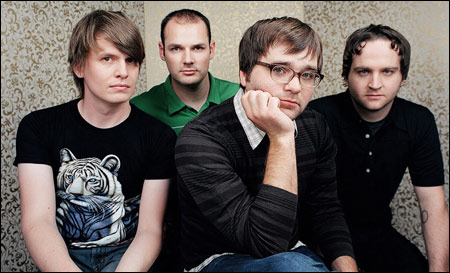
LIGHTS, ACTION!: “People do have to pay more money for tickets and a lot of people who come to see us now expect a concert, not just a show.”
|
Ben Gibbard, the unassuming singer-songwriter who fronts the Seattle-by-way-of-Bellingham foursome Death Cab for Cutie, is, as he puts it, just 45 minutes from “walking out my door and going to San Francisco for Neil Young’s annual Bridge School benefit.” It’ll be the start of yet another Death Cab for Cutie tour — a tour that won’t have him back home until December 9. But he still has a few minutes to spare on the phone, discussing all the changes Death Cab have been through as they’ve made the transition from Barsuk, the tiny indie label that released their 2003 breakthrough, Transatlanticism, to Atlantic for the new Plans. Gibbard’s no stranger to success: earlier in 2003 he hit paydirt with Give Up (Sub Pop), an electro-organic pop album he recorded with Jimmy Tamborello as the Postal Service. But most of his energy over the past decade has gone into cultivating a career with Death Cab through the kind of slow, steady, deliberate growth that few bands are able to sustain. He’s typically reflective as he prepares for Death Cab’s biggest venture yet — a cross-country tour of large theaters that brings them to the Opera House November 2 and 3.
Was it unnerving to have a film crew shooting Drive Well, Sleep Carefully on the road with you as you were making the move from Barsuk to Atlantic?
It was a rough tour for us. But it was actually legitimizing to have the film crew there. I think I thought we were going to look really cool, like U2 in Rattle and Hum or something. But no, we just looked like the dorky people that we are. For better or worse, it captured what we’re really like in person. And I think for our self-esteem and egos that was a good thing.
You do come off as a particularly well-adjusted band.
I was actually kind of surprised how little it affected my day-to-day life when we moved from Barsuk to Atlantic and everything stepped up in volume and suddenly you’re splashed across magazine covers you never in a million years thought you’d be on. I mean, we’re still not a household name. But I had this idea that my life would change drastically as the band’s popularity increased, that I’d be recognized on the street and it would be harder to go places. The reality is that I do get recognized here and there and people sometimes act weird because they’re used to seeing us on stage or on TV and instead we’re buying deodorant at Walgreens, but it hasn’t really made me feel any more established or secure in what I do. You know, I still feel the insecurities that drive anybody to be creative and make music or art, and I don’t think that becomes any easier when more people are paying attention. I don’t think it becomes any harder, either. It’s just that things around us have changed, and it’s not like we’re just the same old guys we were when we started in ’98. Clearly, we’ve gotten older and the stakes have changed. But through all of it, it’s been fun to look around and realize that this is kind of great, that I’m enjoying this. And if the next record doesn’t sell five million copies, I’m not going to jump off a bridge. I mean, I don’t look at a SoundScan to validate my daily life.
You’ve had time to adjust to each new level of success.
We’ve been fortunate in that we’ve been as comfortable as a band can be in making the kind of decisions we’ve had to make, from the “Should we go on this tour and maybe make $50 a day even if I have to quit my job?” all the way to signing a major-label deal. And going through all the phases of taking time off from work to go on tour and then eventually getting that first big royalty check that allows you to quit your job to the point where we are now, I think it’s allowed us to be responsible not only in our personal finances but also in how we go about doing the ugly part of the job, which is the business of being a band.
ADVERTISEMENT
 |
In a way you’re lucky that your closest brush with sudden pop stardom came with the Postal Service and not with Death Cab.
I know exactly what you mean. That record has probably fallen into the hands of a lot of people who don’t know anything about indie rock. And that’s fine for me. I think one of the most ridiculous questions I ever get asked is, “Were you surprised by the success of the Postal Service?” I mean, abso-fucking-lutely. There’s no way that anyone could have ever predicted that. And Jimmy and I are slowly working on new stuff. It’s a slow, slow process. We know there’s no way to live up to that first record. It’s been too long and, well, it’s not a matter of not being able to make a good record. I’m convinced we’ll make a great Postal Service record. But I don’t expect it to repeat the success of the first one.